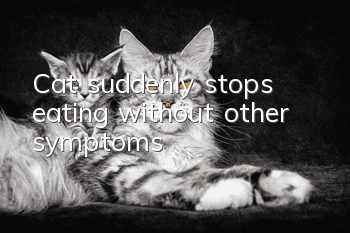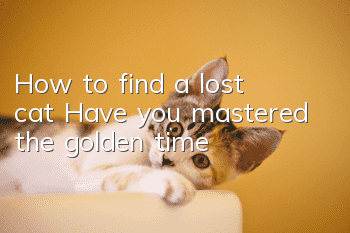Cat suddenly stops eating without other symptoms

1. Caused by illness. If a cat has no appetite to eat, it may be that the cat is sick. It may be caused by stress, poisoning, viral infections, and visceral diseases such as pyometra and liver failure. Since the cat has no other abnormal symptoms, the causes of the disease to be considered will be more diverse, and the clinical examination also needs to be diverse. The main examinations include blood routine, SAA, biochemical examinations, ultrasound and other imaging examinations, etc., focusing on checking whether there are lesions in the cat’s internal organs. If the cat subsequently develops abnormal symptoms, it needs to be dealt with promptly and it is necessary to send the cat to the doctor for examination and treatment in time.
2. Food problem. If your cat doesn’t eat, determine if the problem is with the cat’s food. Owners should check the food they feed their cats to see if there is any odor or qualitative change. They can intuitively identify the safety of the food by smelling the food and observing the color. If it is a food problem, the owner needs to replace the food with fresh food in time and wait and see whether the cat's appetite recovers.
3. Poor digestion. One of the major reasons affecting cats' appetite is indigestion. Cats' gastrointestinal tracts are relatively fragile and their gastrointestinal motility is slow. Many foods are sometimes not digested completely in time. The owner can feel the cat's belly to see if it is full and slightly bulging. The owner can feed the cat digestive powder to help the cat supplement beneficial bacteria and digestive enzymes, increase the cat's gastrointestinal motility, and help the cat digest so that it can eat better.
4. The dining environment or utensils are not clean. Cats are very clean animals, and their sense of smell is easily affected by smells. Owners can also check whether there is any odor in the food bowl and water bowl where the cat eats, whether the food bowl is clean, and whether there are any smells and residues left by the cat’s food, which will affect the cat’s appetite. If there are food residues, etc., the owner needs to clean them up in time. Wash the cat's food bowl frequently every day and change the water frequently to allow the cat to eat hygienically.
5. Cats may be infected with parasites. If there are parasites in the cat's body, the cat will feel uncomfortable and not want to eat. In this case, you need to take the cat to the hospital to check whether it is infected with parasites.
6. The weather is hot or the food is unappetizing. If the weather is too hot in summer, the cat will feel uncomfortable and its appetite will decrease. You can let the cat drink more water. If the food is not to your liking, you can consider changing the cat's food, change the food pattern, and observe whether the cat returns to normal eating.
7. The cat may have hair balls in its belly. Cats lick their fur frequently every day, and most cats will develop hairball syndrome, which can lead to problems such as loss of appetite, lack of energy, and constipation. In this case, you can give the cat regular cat grass or hair removal cream. These methods can help the cat vomit hair balls, improve the cat's appetite, and allow the cat to resume eating.
8. Dental problems. If a cat suffers from stomatitis or oral inflammation, the mouth will be irritated when eating, causing the cat to stop eating. If you observe and smell a strange smell in your cat’s mouth, a foul odor and saliva flowing out, you need to check it out.Does your cat have stomatitis? If you suffer from stomatitis, you must take it for treatment in time. Long-term stomatitis leading to not eating will affect the cat's health.
Causes of cat anorexia:
1. Physiological anorexia
Physiological anorexia is common in kittens during the teething period, adult estrus, and female cats’ pregnancy reactions , and pre-clinical. Generally, cats have no other abnormal symptoms, and their spirits, body temperature, breathing, eating, drinking, and defecation are all normal.
Stressful stimulation, hot weather, overeating, eating indigestible food, changing to a new environment, the presence of strangers, etc. can also cause cats to be anorexic. Solution: Generally, owners do not need to worry too much. They can add canned snacks to the cat appropriately to increase the palatability and diversity of the food. Give the cat plenty of drinking water and observe it at home for a day or two before it can recover on its own.
2. Pathological anorexia
Generally, cats show early symptoms of the disease, accompanied by other symptoms such as fever, vomiting, diarrhea, cough, abdominal pain, etc. Commonly seen in the early stages of stomatitis, periodontal diseases, gastrointestinal diseases, and viral infectious diseases. Fever will reduce appetite in the short term. Solution: When symptoms are discovered, the owner needs to take the cat to the hospital for examination as soon as possible and receive timely treatment. If it is not caused by illness after the examination, you can stop eating for 24 hours and drink enough water during the stop. Generally, your appetite can be restored the next day. Appropriately increasing the cat's amount of exercise and consuming energy can help the cat increase its appetite.
- What to do if a Canadian hairless cat suffers from postpartum hemorrhage
- Is it possible to cure cat plague?
- Why do cats need cat litter?
- Can cats drink yogurt? Anmuxi
- Cat vomits yellow water after vaccination
- How to treat kittens with catnip
- Can cats eat mung bean sprouts?
- Can Ragdoll cats eat diarrhea?
- Can a dehydrated cat eat cat strips?
- How many days should cats be given monoclonal antibodies to prevent feline plague?



